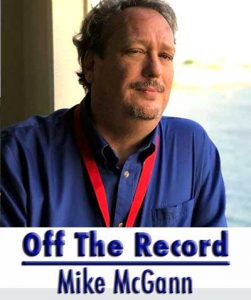By Mike McGann, Editor, The Times
 Hopefully, everyone survived Thanksgiving without finding themselves in a political tussle with friends and family.
Hopefully, everyone survived Thanksgiving without finding themselves in a political tussle with friends and family.
While much is wrong with our world and country, it is important to remember the things we all share, such as the love of friends and family, are something we all cherish. We all want to be financially secure, safe, healthy and have a true purpose in life. This is what unites us.
Under normal circumstances, there would already be much today to divide us, from the acceleration of the pace of change over the last two decades to honest disagreements about the future of our country and people.
But there is artificial division as well.
Some is being driven by nation-states (Russia is just one, but the most active belligerent), via social media, compromised media outlets (Fox News Channel, OANN, NewsMax and RT among others) and active measures disinformation campaigns. Other misinformation comes from a profit motive — arguably MSNBC and CNN overplay conflict to drive up ratings and play to their respective left-of-center audience. There is also an entire political class that benefits from driving conflict from the left and the right (you’ve probably seen the wildly misleading emails asking for money from both sides of the political spectrum) — a lot of campaign donations end up in the pocket of high-priced consultants who thrive on social and political conflict.
Due to economic and technology forces, we find now that even the truth — a shared understanding of reality — is under attack. Yes, there are “active measures” sources of disinformation (and a President who lies relentlessly about virtually everything), driven by foreign actors (and some domestic sources who benefit from chaos).
But just as dangerous, we are losing local news. Without local news, we’re forced into the echo chamber of national media, which is less accountable and driven largely by whatever generates the largest audience. It is local news that reminds us the local official of the “other” party cares about the community and isn’t such a bad sort — when we don’t see members of the other party as “evil,” a lot more can get done.
But that is going away.
Some of the blame for that is the news industry’s poor adaptation to changing technology and market conditions (although arguably, Google and Facebook share a bigger load of the blame for cannibalizing and then monopolizing ad revenue). But only some, and maybe not even the majority, of blame falls there, in my opinion.
More corrosive has been 30 plus years of raiders from Wall Street devastating the industry for short term gain.
It started with leveraged buyouts in the mid-1980s (I went through the first of my sales and then closures of venerable print newspaper properties in 1986, but it would not be the last). Buyers would float high-interest “junk” bonds to pay for acquisitions of then-healthy newspapers (often making 20 to 30% net profit). The new owners would cut staff to slash spending to cover the costs of the bonds, and slowly, the newspapers would bleed readers and advertisers because of poor content, resulting in further staff cuts, and so on, in a downward cycle. The new owners had hoped “synergies” would allow for enough savings to continue profitable operation, but were pretty much always wrong.
That was bad enough and along with poor adoption to the Internet and its weak revenue models, would have been enough to cripple many local publications.
But it gets worse.
Hedge funds started buying newspapers, not with the idea of making them more efficient and operating them at a profit, but rather, selling off their real estate and then bleeding as much money as possible out of them before closing them down.
One of those companies is Alden General Capital, which owns The Daily Local News among other area newspapers. Alden has gutted the DLN’s editorial staff — the only reason there’s anything like a newspaper there is because a tiny handful of people are working ridiculous hours (some seven days a week) to keep their paper alive. They are good people being taken advantage of because of their loyalty to their readers and community.
Alden owns newspapers across the country and is similarly bleeding them to death for profit — arguably not only are they a cancer on the industry, but one on American society in general.
Still, were it not for digital monopolies by Facebook and Google, Adam Smith’s “invisible hand” would have solved the lack of local news, as digital local news startups with lower infrastructure and legacy costs rose up to replace them.
But just as those news sites, including this one, began to thrive in 2010-13, Google started buying up all of its digital ad competitors, driving down the price of digital ads, which hammered the pricing of local ads. Meanwhile, Facebook began competing in the ad space as well, and appears to have reduced the profile of news sites on its platform, cutting traffic and growth options.
That hurt the newcomers as well as the legacy publications, dramatically cutting local news coverage.
I saw a frightening stat recently: 22% of all newsroom employees live in New York City, Washington, D.C. or Los Angeles. Those three cities account for just 13% of the population of the US, yet it is those people driving the national narrative.
I’d argue that America needs more stories about local school boards and high school sports coverage than it needs dozens of snarky takes on DC gossip. But the eyeballs — and the revenue — goes to the latter. Some have suggested that bloggers and amateurs would fill the gap, but without the skills, experience or professionalism, that sort of outlet is uneven and largely unreliable.
I wish I knew the answer to solve this — news like so many industries has been gobbled up by corporate types with a singular focus on quarterly numbers, not the bigger picture.
We need local news — we need to know what is happening in our towns and counties. We need the good news and the bad, reported carefully and thoroughly by underpaid professionals who do it because they care. Now, folks are expected to work for free or put in 80-hour weeks for less than they’d make slinging hoagies at Wawa.
This has to change, but I’m at a loss how it does.
Without local news, we lose a shared community, a shared reality and a link to basic truths about who we are as a nation.
Without it, we may lose our democracy as well.






